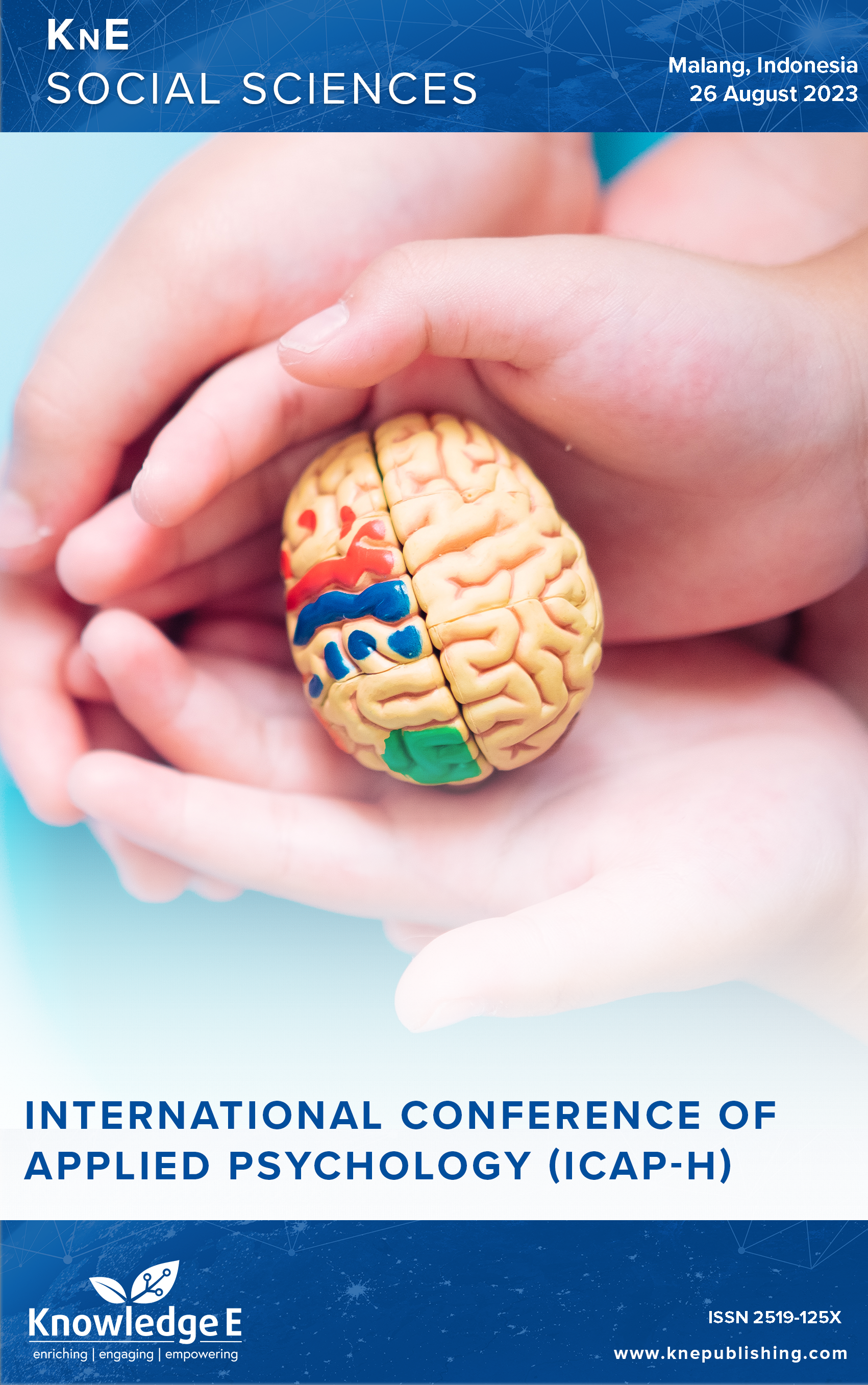The Influence of Characteristic Strengths on Nature Relatedness in Generation Z
DOI:
https://doi.org/10.18502/kss.v9i5.15168Abstract
The many environmental problems, issues, and natural disasters make Generation Z feel compelled to carry out activities that reflect environmental concerns. One cannot be moved to carry out these noble activities voluntarily if one’s characteristics do not refer to positive characteristics. Various factors, including individual characteristics, influence a person’s tendency to engage in environmentally friendly activities. This research aims to see the relationship between characteristic strengths and nature relatedness, especially in Generation Z. This study used a quantitative method, with 301 generations Z subjects born in 1997–2012 in Indonesia who were selected using accidental sampling. Instruments in this study were the Nature Relatedness Scale (NRS) and the Values in Action Inventory Strength of Youth (VIA-Youth). The results of the research showed that there is a significant effect of characteristic strengths on nature-relatedness (significance value = 0.000 < 0.05). From the three dimensions of characteristic strengths, only the transcendence strength does not affect naturerelatedness (significance value = 0.062 > 0.05).
Keywords: characteristic strengths, generation Z, nature relatedness
References
Achmad, D. Konstruksi sosial zero waste: Studi kasus pada masyarakat kelurahan ballaparang kecamatan rappocini di kota makassar. 2021;14.
Adiwena BY, Djuwita R. Manusia dan lingkungan alam: Analisis faktor konfirmatori terhadap Nature Relatedness Scale Bahasa Indonesia. Jurnal Psikologi Sosial. 2022;20(1):57–71. DOI: https://doi.org/10.7454/jps.2022.08
Affandi, R. Peran green peace sebagai organisasi internasional non-pemerintah (INGO) dalam mengatasi kerusakan lingkungan hidup di Indonesia. 2017.
Amandari SL, Sartika D. Hubungan antara character strength dengan penyesuaian diri yang efektif pada narapidana di lapas sukamiskin kelas IIA bandung [Sosial Dan Humaniora]. Prosiding Penelitian Sivitas Akademika Unisba. 2014;4:519–525.
Chandra F. Peran pemuda sebagai agen of change lingkungan hidup dalam rangka mewujudkan pembangunan berkelanjutan. Jurnal Hukum STIH YPM. 2021;3(1):1–11.
Colley K, Craig T. Natural places: Perceptions of wildness and attachment to local greenspace. Journal of Environmental Psychology. 2019;61(December 2018):71–78. DOI: https://doi.org/10.1016/j.jenvp.2018.12.007
Darmansyah MN. Pengaruh nature relatedness terhadap kesejahteraan psikologis. Skripsi Sarjana, Universitas Muhammadiyah Malang. 2023.
Gander F, Hofmann J, Proyer RT, Ruch W. Character strengths–Stability, change, and relationships with well-being changes. Applied Research in Quality of Life. 2020;15(2):349–367. DOI: https://doi.org/10.1007/s11482-018-9690-4
Flavell JH. Metacognition and cognitive monitoring: A new area of cognitivedevelopmental inquiry. American Psychologist. 1979;34(10):906–911. https: //www.semanticscholar.org/paper/Metacognition-and-Cognitive-Monitoring%3A-ANew- Area-Flavell/ee652f0f63ed5b0cfe0af4cb4ea76b2ecf790c8d DOI: https://doi.org/10.1037//0003-066X.34.10.906
Kasser T, Rosenblum KL, Sameroff AJ, Deci EL, Niemiec CP, Ryan RM, et al. Changes in materialism, changes in psychological well-being: Evidence from three longitudinal studies and an intervention experiment. Motivation and Emotion. 2014;38(1):1–22. DOI: https://doi.org/10.1007/s11031-013-9371-4
Laumann K, Gärling T, Stormark KM. Rating scale measures of restorative components of environments. Journal of Environmental Psychology. 2001;21(1):31– 44. DOI: https://doi.org/10.1006/jevp.2000.0179
Liang J, Li J, Lei Q. Exploring the influence of environmental values on green consumption behavior of apparel: A chain multiple mediation model among chinese generation z. Sustainability (Basel). 2022;14(19):12850. DOI: https://doi.org/10.3390/su141912850
Luna LM, Van Tongeren DR, Witvliet CV. Virtue, positive psychology, and religion: Consideration of an overarching virtue and an underpinning mechanism. Psychology of Religion and Spirituality. 2017;9(3):299–302. https://doi.org/10.1037/rel0000127 DOI: https://doi.org/10.1037/rel0000127
Mayer FS, Frantz CM, Bruehlman-Senecal E, Dolliver K. Why is nature beneficial? The role of connectedness to nature. Environment and Behavior. 2009;41(5):607–643. DOI: https://doi.org/10.1177/0013916508319745
Merino A, Valor C, Redondo R. Connectedness is in my character: The relationship between nature relatedness and character strengths. Environmental Education Research. 2020;26(12):1707–1728. DOI: https://doi.org/10.1080/13504622.2020.1825630
Nisbet EK, Zelenski JM, Murphy SA. Happiness is in our nature: Exploring nature relatedness as a contributor to subjective well-being. Journal of Happiness Studies. 2011;12(2):303–322. DOI: https://doi.org/10.1007/s10902-010-9197-7
Novella L. Pengaruh character strengths dan dukungan sosial keluarga terhadap perilaku eksplorasi karir pada siswa kelas IX di jakarta selatan. Skripsi Sarjana, Universitas Islam Negeri Syarif Hidayatullah Jakarta; 2015.
Park N, Peterson C, Seligman MEP. Strength of character and well-being. Journal of Social and Clinical Psychology. 2005;23(5). https://doi.org/10.1521/jscp.23.5.603.50748 DOI: https://doi.org/10.1521/jscp.23.5.603.50748
Putra YS. Theoritical review: Teori perbedaan generasi. Among Makarti. 2017;9:2. DOI: https://doi.org/10.52353/ama.v9i2.142
Ridla F, Muslimah. (2021). Identifikasi pendidikan moral generasi z di masa pandemi. Pincis: Palangka Raya International and National Conference on Islamic Studies. 2021;1(1):115–1130.
Sa’adadiyah N, Saritika D. Hubungan antara dukungan sosial dengan character strength orang tua dari anak penderita kanker di rumah cinta bandung. Psikoborneo: Jurnal Ilmiah Psikologi. 2017;5(2):198–203. DOI: https://doi.org/10.30872/psikoborneo.v5i2.4375
Saleh U, Al-Fitra NF, Azizah SN, Ramdhani M M, Nurfida, Aliftiansyah H, Ariqah Hanafiah Farid A. Optimization of learning during pandemic: The correlation analysis of character strengths and self-regulated learning. Proceedings of the Interdisciplinary Conference of Psychology, Health, and Social Science. 2022;639(Icphs 2021):84–89. DOI: https://doi.org/10.2991/assehr.k.220203.014
Sugiyono. Metode Penelitian Kuantitatif. Bandung: Alfabeta; 2016.
Sutrisno. (2020). Internalisasi pendidikan moral pada perguruan tinggu di Jepang. Jurnal Civics: Media Kaajian Kewarganegaraan. 2020;17(1):50–59. DOI: https://doi.org/10.21831/jc.v17i1.30338

